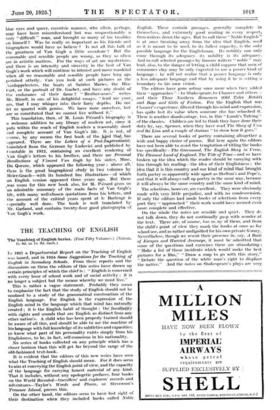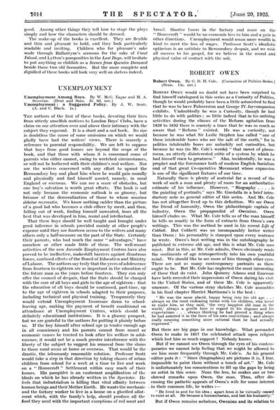THE TEACHING OF ENGLISH
•
IN 1921 a Departmental Report on the Teaching of English -was issued, and in 1924 Some Suggestions for the Teaching of English in Secondary Schools. From these reports and the discussions on them the editors of this series have drawn up certain principles of which the chief is : "English is concerned with every hour of school work and of social activity ; it is no longer a subject but the means whereby we must live."
This is rather a vague statement. Probably they mean to emphasize the fact that the study of English should not be confined- to a study of the grammatical construction of the English language. For English is the expression of. the English mind in the language which that mind• hai naturally created ; it is the English habit of thought ; the:familiarity
with sights and sounds that are English as distinct any other -nation's: A child who has been properly trained should be aware of all this, and should be able to use the machine of - his language with full knowledge of its subtleties and capacities; to know what part of his personality exists simply from his Englishness, to be, in fact, self-conscious in his nationality. No series of books collected on any principle which has a closer horizon than this will get far beyond the range of the old-fashioned text-book.
It is evident that the editors of this new series have seen what the Teaching of English should mean. For it does seem to aim at conveying the English point of view, and the capacity of the language for carrying honest material of any kind. That it includes, without any apologetic prefaces, four books on the World Revealed—travellers' and explorers' records and adventures—Taylor's Words and Places, or Stevenson's Treasure Island, proves this.
On the other hand, the editors seem to have -lost sight of their - destination when they included books called Noble. English. These contain passages, generally complete in themselves, and extremely good reading in every respect, from writers down the ages. But to call them "Noble English" is at once breaking away from the idea that English, used as it is meant to be used, to its fullest capacity, is the only .possible language for the Englishman. Its nobility can only come through its adequacy— its nobility is its adequacy. And to call selected passages by famous writers " noble " may lead, also, to the danger of letting a child suppose that men of commoner clay may be only expected to use a poorer kind of language ; he will not realize that a poorer language is only a less adequate language and that by using it he is setting a boundary to his .own vision. ..
The editors have gone astray once more when they added their " approaches "—to Shakespeare, to Chaucer and others= and their Three Northern Romances (Old Tales Retold) and Boys and Girls of Fiction. For. the English that was Chaucer's experience, filtered through his mind and expression, has quite lost its value when someone else has rehashed it. There is another disadvantage, too, in this "Lamb's Taleing'' of the classics. Children are led to think they have done their duty by, say, Spenser, when they have read The Story of Una and the Lion and a couple of stanzas " to show how it goes."
There are :Several books of poetry containing altogether a Wide and happy choice of poems. But here again the editors
have not been able.to resist the temptation of titling the books
too specifically—The Greenwood, The English Story in Verse, The Pleasant Land of England, The Tide of Time—and so have
broken up the idea which the reader shOuld be carrying with
him through his readingthe idea of their Englishness ; the idea that it is this country and our kind of mind that brought forth poetry so apparently wide apart as Skelton's and Pope's, and that it will always call up poetry in the same way, because it will alwa.Vs be the same country and the same kind of mind.
• The selectiOns, however, are excellent. They were obviously
niade With. very little prejudice, and with no condescension.If only the editors had made books of selections from emir poet they " approached.' their work would have seemed even more complete and effective. On the whole the notes are sensible and quiet. They do not talk down, they do not continually gasp with wonder it the text. There are, of course, too may of them, and from the child's point of view- they mark the books at once as for school use, and as rather undignified for his own private library. Nevertheless, though we resent their presence in, say, A Book of Escapes and Flurried Journeys, it must be admitted that some of the questions and exercises there are stimulating : " Make a list of those- incidents Which would make the best pictures for a film," " Draw a map to go with this story," " Debate the question of the white man's -right to displace the native." And the notes- on Shakespeare's plays are very
good. Among other things they tell how to stage the plays simply and how the characters should be dressed.
The make-up of the books is excellent. They are flexible and thin and pleasant to hold, and they look particularly readable and inviting. Children who for pleasure's sake wade through Ballantyne's sermons for the sake of Coral _Wand, and Lytton's pomposities in the Last Days, will hesitate to put anything so childish as a Scenes from Quentin Durward beside those two old favourites. But the more complete and dignified of these books will look very well on shelves indeed.











































 Previous page
Previous page